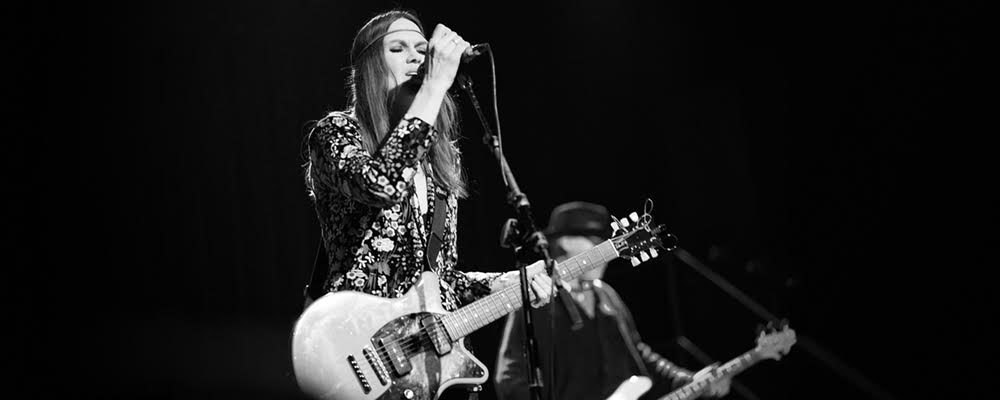Juliana Hatfield Elaborates on the Mercilessly Dark and Joyfully Hummable Stylings of ‘Blood’
Adi Mehta
Since her emergence in the late ‘80s with Boston indie outfit Blake Babies, Juliana Hatfield has maintained a fruitful output as both a solo artist and a member of sundry bands. She began the ‘90s with the Lemonheads and established herself as a distinctive voice of the era with the Juliana Hatfield Three, which she reformed to critical acclaim in 2014. Long after so many of her cohorts came and went, she continues to turn out album after album, combining angst and authenticity with snappy songsmithing. Her nineteenth solo effort, “Blood,” is at once a testament to the times and a continuation of her signature style.
The new record is about as dark as the title suggests, unsparing in both its psychological explorations and its societal indictments. Hatfield tackles both the personal and the political with plenty of grit, punk energy, and torrential distortion, but packages it with a certain playfulness. The songs are as catchy as they are abrasive, with their volatile contents held together judiciously by musical elements that strike a fine balance. Hatfield sang and played guitars, keyboards, and drums on the album, and it’s fitting, considering such immersion, that her lyrics seem to hold nothing back. She spoke with Entertainment Voice about the creative process, musical choices, and lyrical underpinnings of her latest work.
Like most artists creating music over the last year and change, Hatfield found her circumstances restricted, and her sounds, in turn, shaped by the pandemic. She recorded “Blood” largely during self-isolation, incorporating her laptop for the first time, shuttling sounds between her home and that of her chief collaborator on the album, multi-instrumentalist Jed Davis. Consequently, a certain controlled chaos makes its way into the explosive energy of the songs, with DIY undercurrents ever present in Hatfield’s punk ethos seeming especially pronounced at moments. “I have done a lot of recording at home — on an old 8-track machine,” Hatfield recalls, “so that was not a big stretch for me to work within that kind of home isolation. What did send some of my sounds into new directions, however, was collaborating with Jed Davis who took some of my musical bits and played with them at his home studio to create some of the interesting sonic stuff like elaborate drum programming and certain guitar-sound treatments.” These touches come through on the momentous opener, “The Shame of Love.” At once, there is the distinctly ‘90s aesthetic that has always been central to Hatfield’s sound, but overlain are novel quirks and darts in surprising directions, such as sputters of distortion that shift rhythm in a way not unlike dubstep wobble bass. “Some of that was Jed Davis,” Hatfield explains, “For “Shame of Love” he took an acoustic guitar progression that I had recorded into my computer’s built-in camera/mic, and he added the distorted drums and boosted and altered the sound of the crappy original guitars.”
The album abounds with strikingly macabre content, with song titles like “Torture” and “Mouthful of Blood.” Perhaps the most brutal of all is “Chunks,” with its epic chorus of “Someone’s gonna kick you in the head… Someone’s gonna burn down your house.” Regarding the inspiration for such impassioned outbursts, Hatfield is succinct, explaining, “It was inspired by living in the modern United States, which is a country full of gun-lovers; full of violence.” The content gets more violent and more sociopolitically explicit yet on “Had a Dream,” in which Hatfield narrates a gruesome stabbing scene that builds up to the chorus line, “It was a very American Dream.” Hatfield straightforwardly sums it up, “Again, the United States is a violent place. There are more guns than people here. And there are more than 300 million people. You can do the math and it is insane.”
Elsewhere, the social criticism is a bit more subtle. On “Mouthful of Blood,” Hatfield takes on cancel culture, beginning, “If I say what I want to say / It just might get me killed,” and going on to sing of being “crucified for having wrong opinions.” In characteristic, deadpan style, she elaborates, “Modern-day media is full of opportunities to say the wrong thing. Everyone has to be really careful with language and speech.” It might seem hard to reconcile such a ready awareness of the danger involved in free expression with the merciless subject matter on display. Then again, the album is full of charming contradictions, and therein lies much of its musical potency. In “Nightmary,” Hatfield repeats, “I’m in a nightmare, and I can’t wake up” with a singsong delivery that seems to mock the abysmal situation at hand, while also providing a sense of relief from the agony in the lyrics with its catchy, upbeat quality. This balance between dark and light elements is key to many of the new tracks. Hatfield explains, “The darkness is real and it is all around if you have your eyes open but inside of me there is a bottomless reserve of joyful melodies. I can always tap into that.” This makes its way into the album via mellotron flutes and strings that lighten the burden of heavy riffage, along with an abundance of hummable tunes. Perhaps melodic instincts are especially developed this time around, as a result of Hatfield’s recent excursions into poppier avenues. 2018 saw the release of “Juliana Hatfield Sings Olivia Newton-John,” and the following year came “Juliana Hatfield Sings the Police.” Hatfield hinted a while back that she had plans of covering another artist, and she now clarifies, “I have not yet decided but, yes, I am pretty sure the next album will be covers.” Whatever it turns out to be, it’s safe to say Hatfield is ready to tackle it, after the cathartic release that is “Blood.”
“Blood” releases May 14 on Apple Music.

